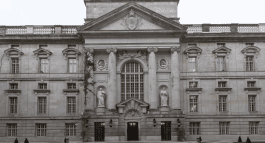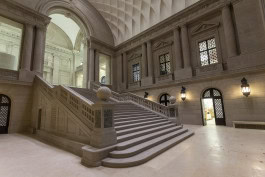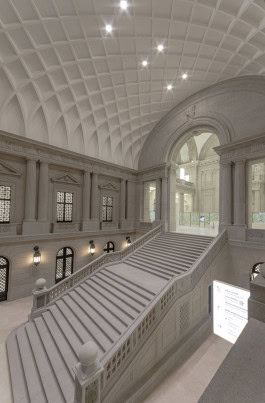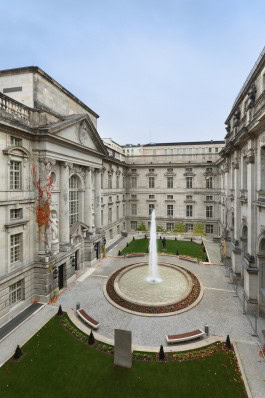
It is Germany's largest academic research library and one of the leading ones in the world, founded in 1661. The recent massive restoration of the roofs, interiors and facade aimed to highlight the original design of the building, which now includes the 35-meter dome, giving the State Library back its historic appearance. When the lockdown is eased, actual visits will once again be permitted at Unter den Linden.
Some famous items in the Stabi’s collection include the oldest biblical illustrations in the 5th century Quedlinburg Itala fragment, a Gutenberg Bible, the main autograph collection of Goethe, the world's largest collection of Bach's and Mozart's manuscripts, and the original score of Beethoven's Symphony No. 9.

Image credits: Staatsbibliothek zu Berlin PK




Image credits: Staatsbibliothek zu Berlin PK
Image credits: Staatsbibliothek zu Berlin PK
Image credits: Staatsbibliothek zu Berlin PK
Image credits: Staatsbibliothek zu Berlin PK
The library was first known as Churfürstliche Bibliothek zu Cölln an der Spree (Electoral Library at Cölln on the River Spree) and in 1701 became the Königliche Bibliothek (Royal Library). As the name suggests, it was the court library of the king, used as his own private library, but was also accessible to the public. The early collection was very limited.
By 1810, the library became independent and a part of the Prussian State administration, the decision that was closely connected to the newly founded University of Berlin. During this time, the collection significantly expanded, which turned it into the leading library of Prussia. Since that time and up to 1930s, it grew into one of the most important academic libraries in the world.
Unfortunately, National Socialism and the subsequent war destroyed much of the library and its collections. The following decades, the library, torn between East and West, suffered for almost half a century and up to this day has to deal with the consequences and strive to regain its role.
The renovated library houses a total of seven reading rooms. The children’s books collection alone includes over 200,000 volumes, some dating back to the 17th century.

Image credits: Staatsbibliothek zu Berlin PK
Critics might argue that investing over €470 million of federal funds into this long renovation was a waste of money, as people are increasingly switching to online reading or audio and e-books. But current studies indicate that libraries will continue playing a major role in our society. They will remain a place for research but will also evolve into venues for co-working and various events, as well as spiritual spaces for solitude, thinking and dreaming large.
As Albert Einstein once said, “the only thing you absolutely have to know is the location of the library.” Much to our joy, libraries today continue to attract many fans, young and old, despite the prevalence of digital offerings.

Image credits: Staatsbibliothek zu Berlin PK
Related Articles: